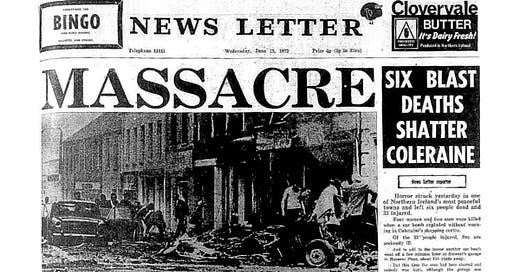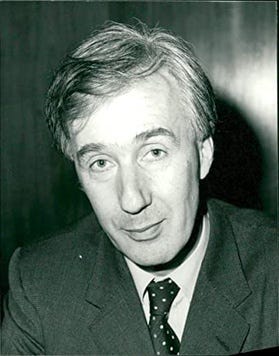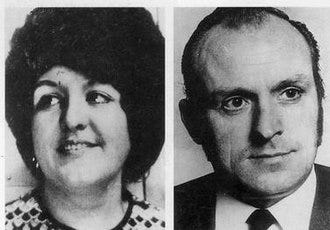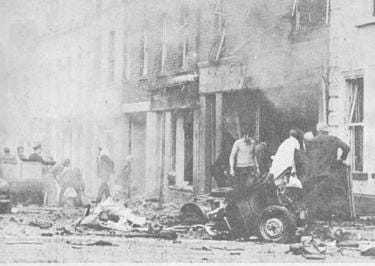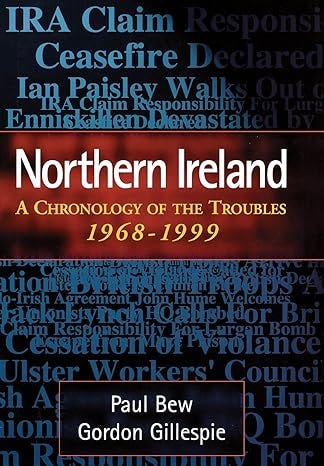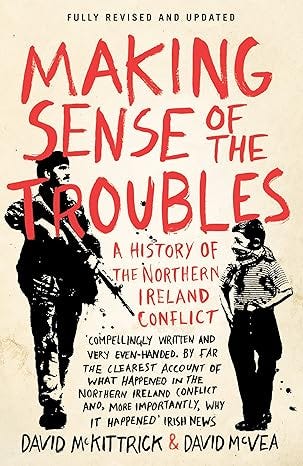June 1973 saw Paul McCartney & Wings release the single “Live & Let Die”. For fans of the song, you’ll be familiar with the lyrics;
“You used to say live and let live … But if this ever-changing world in which we're livin'. Makes you give in and cry”
These lryics are poiniant when we look at what had taken place in Northern Ireland, where “Live and Let Live” was not on the agenda for rival paramilitary groups…
Political developments in June 1973
June 1973 began with changes at the Northern Ireland Office when Lord Belstead replaced Lord Windlesham as the government spokesman on Northern Ireland and David Howell became Minister of State at Stormont.
On the 7th of May, K.P Bloomfield wrote a memorandum in the form of a Note of Procedures for members of an incoming Executive. he suggested that it would be suitable as a basis for a speaking brief for the chief executive member at the first meeting or formal instructions to be issued as a circular from the Central Secretariat.
Objectives of the policy
The overriding objectives of policy must be;
To work for the earliest possible end to violence.
To accomplish the reconstruction, physical, economic and social, of what has been damaged or destroyed.
To create the base for economic and social advancement, and in particular, to expand employment opportunities.
To build up general public confidence in the impartiality and efficiency of the new institutions of government.
General methods of working
The general methods of working within the Executive must be as follows;
Of the broadly based nature of the Executive itself.
Of the desirability of achieving, with the Secretary of State, a consistent and coordinated approach to the problems of Northern Ireland, whether these fall into the "excepted", "reserved" or "transferred" category.
Of the statutory role given to consultative committees of the Assembly in assisting members of the Executive in the formulation of policy.
Confidentiality
Executive business is protected by the provisions of the Official Secrets Act, and incoming members of the Executive will be asked to sign a declaration acknowledging that the requirements of that Act have been drawn to their attention.
Private Interests
The rules formerly governing the conduct of Ministers of Northern Ireland will apply. Members of the Executive will be asked to give information to the Central Secretariat on any directorships they may hold and advised as to whether there is any danger of a conflict of interests. Where it is considered proper for directorships to be retained, this will be publicly disclosed. At Executive meetings, members will be required to declare any form of private interest.
Collective Responsibility
If the new system is to gain the confidence of the community, it must be seen to operate consistently and coherently. Good government cannot be achieved by the pursuit of separate and uncoordinated departmental policies. Within the context of a broadly-based Executive, Heads of departments must be punctilious about raising with their colleagues any matter which may be particularly difficult or controversial. If there is the slightest doubt about taking a decision as a purely departmental act, the chief executive member or Secretary to the Executive should be consulted. This applies in particular to powers of appointment.
In the taking of decisions within the Executive any form of vote is to be avoided if at all possible. The objective must be to reach decisions by which, taking one with another, the Executive as a whole can stand collectively.
Special considerations apply to issues which do not fall to be determined by the Executive - in particular, the question of the constitutional status of Northern Ireland and "law and order" matters while these remain the responsibility of the Secretary of State. It is appreciated that members may have to reply to questions on these issues in terms which are consistent with their known views and those of their party and its supporters; but replies should not be incompatible with the form of Oath of Office taken b,y the Executive, or in terms which will provoke friction within the administration.
Detailed procedures for business
It is of particular importance, in terms of the new structure, that members of the Executive should have an opportunity to consider carefully the full implications of issues coming before them. Accordingly, matters will normally be placed on the Executive agenda only where there is adequate notice and a memorandum is circulated in ample time. This rule will only be relaxed in quite exceptional circumstances and on the personal direction of the chief executive member.
Memoranda must only be submitted after all other interested departments have been consulted and their views reconciled as far as possible. In all cases, the following information should be incorporated where appropriate;
Details of financial and manpower implications.
Details of any time restraints, particularly in cases requiring legislation.
Justification for any proposal to bypass the consultative committee procedures.
Identification of any matters touching upon the "excepted" or “reserved" categories.
Where changes in policy are proposed, the normal sequence of events will be as follows;
The Head of the Department primarily concerned will prepare a draft Consultative Policy Memorandum (CPM), which will review the problem and set out the arguments for and against the various policy options. This will be considered by the Executive, with the object not of reaching any firm decision on policy at this stage, but of approving the CPM for submission to the appropriate consultative committee of the Assembly.
After the CPM has been considered by the consultative committee, the Head of Department will submit a further memorandum to his colleagues, summarising the arguments within the committee, and making a recommendation to his colleagues on the course of policy to be adopted, including, if appropriate, the drafting of a proposed Measure.
If a proposed Measure is required, the Executive will consider it in draft, with a view to approving its submission to the consultative committee.
As a final stage, the Head of Department will report to the Executive on the arguments relating to the proposed Measure in the Committee, and propose any amendments he considers desirable in the light of that discussion.
If there are "excepted" or "reserved" implications, the office of the Secretary of State will normally have been consulted informally before stages (i) and (iii), and formally after stage (iv) and before the introduction of the proposed Measure.
On the 14th of June, James Callaghan, then shadow Foreign Secretary, speaking in the House of Commons, said that Britain might reconsider its position concerning Northern Ireland if the Assembly was 'sabotaged'.
Just 9 days later, Harold Wilson, then leader of the Labour Party, said that if the principles in the White Paper were rejected it might be necessary to reconsider the relationship between Britain and Northern Ireland.
Elections to the Northern Ireland Assembly were contested in Northern Ireland on the 28th of June. There was some violence during the day, some of which was directed against several polling stations. However, the turnout was high at 72.3%. The election gave those parties supporting the White Paper 52 seats whereas those parties against the paper obtained 26 seats. However, a number of the candidates who were elected with the 'pro-White Paper' parties were themselves against the proposals, reducing the margin in the new Assembly.
Shootings (and stabbing) in June 1973
02/06/73 - Civilian, Samuel McCleave (25), was found beaten and stabbed to death, Hill Street, Belfast. it’s believed that a Loyalist group were responsible.
03/06/73 - Two Protestant civilians, Sarah McComb (41) and Alfred Acheson (48), were shot dead by members of a Loyalist paramilitary group (believed to be the UVF) during an attack in Druse Street, Belfast.
05/06/73 - The IRA shot dead patrolling RUC officer David Purvis (22) on Belmore Street, Enniskillen, County Fermanagh from a passing car.
05/06/73 - Civilian, Terence Herdman (17) was found shot dead near Clogher, County Tyrone. The IRA claimed he was an informer.
10/06/73 - The UDA shot dead a Catholic civilian, Daniel O’Neill (35), in the Deerpark Road area of Belfast. A Protestant bus driver, Samuel Rush (45), was also killed when his bus was caught in the crossfire between the UDA and the British Army.
12/06/73 - Civilian, Anthony Mitchell (38), was shot by the British Army while walking past the Springfield Road British Army/Royal Ulster Constabulary base, Belfast.
15/06/73 - UDA member, Michael Wilson (18), was shot dead at the home of his relative, UDA leader Tommy Herron, Ravenswood Park, Braniel, Belfast. Internal Ulster Defence Association dispute.
16/06/73 - Civilian, Daniel Rouse (17), was found shot at the side of Dunmurry Lane, Dunmurry, near Belfast, County Antrim. It’s believed the UFF were responsible.
17/06/73 - Civilian, Joseph Kelly (25), was found shot by Corr's Corner, Larne Road, near Glengormley, County Antrim. It’s believed the UFF were responsible.
21/06/73 - The OIRA shot dead a Protestant civilian, David Walker (16), near the entrance of the Falls Road, Belfast.
25/06/73 - Protestant civilian, Joseph Cunningham (36), was found shot dead at his home on Nore Street, Belfast. The UFF claimed responsibility and claimed the man had been an informer.
25/06/73 - Protestant civilian, Joseph Cunningham (36), was found shot dead at his home on Nore Street, Belfast. The UFF claimed responsibility and claimed the man had been an informer.
26/06/73 - Paddy Wilson (39), then an SDLP Stormont Senator, and Irene Andrews (29), then his secretary, were found stabbed to death in a quarry on the Hightown Road, Belfast. They had been killed by members of the UFF (a cover name for the UDA. John White was later convicted for his part in these killings. White was later to become a leading spokesman for the Ulster Democratic Party and was involved in the negotiations that led to the 'Good Friday' Peace Agreement on the 10th of April 1998.
26/06/73 - A civilian employed by the British Army, Noorbaz Khan (45), was shot shortly after driving out of Bligh's Lane British Army base, Creggan, Derry.
26/06/73 - Civilian, Robert McGuinness (22), died four days after being shot by the British Army while walking along Brandywell Avenue, Derry.
29/06/73 - The UDA shot dead Protestant cross-community social worker, Sean Armstrong (31), at his home on Eglantine Avenue, Belfast.
Bombings in June 1973
09/06/73 - The UFF claimed responsibility for throwing a bomb into the Avenue Bar, Belfast. Six people were wounded.
12/06/73 - The Provisional IRA detonated two carbombs in Coleraine, County Londonderry, Northern Ireland. The first bomb exploded at 3:00 pm on Railway Road, killing six people (Francis Campbell (70), Dinah Campbell (72), Elizabeth Craigmile (76), Nan Davis (60), Robert Scott (72) and Elizabeth Palmer (60)) and injuring 33, of which several limbs were lost with many left disabled for life. A second bomb exploded five minutes later at Hanover Place. This did not cause any injuries, although it added to the panic and confusion in the area. The IRA had sent a warning for the second bomb but said it had mistakenly given the wrong location for the first.
As the six victims had all been Protestant, the bombings brought about a violent backlash from loyalist paramilitaries, who swiftly retaliated by unleashing a series of sectarian killings of Catholics that culminated in the double killing of Senator Paddy Wilson and Irene Andrews on the 26th of June.
Sinn Féin councillor Sean McGlinchey, brother of Dominic McGlinchey, later INLA Chief of Staff, was convicted of planting the bomb and spent 18 years in prison. He was elected mayor of Limavady Borough Council in 2011.
18/06/73 - The UFF claimed responsibility for throwing a bomb into the Meeting of the Waters pub on Manor Street, Belfast. One man was seriously wounded.
18/06/73 - OIRA members, after forcing their way into Ross' Mill on Odessa Street, Belfast and staging a protest over working conditions, planted a bomb under the manager's car. The blast bomb didn't explode but an incendiary component destroyed the vehicle.
21/06/73 - British soldier Barry Gritten (29), was killed by an IRA booby-trap bomb in an empty building on Lecky Road, Bogside, Derry.
21/06/73 - British soldier David Smith (31), was killed by an IRA booby-trap bomb in an empty building in Strabane.
25/06/73 - Three IRA volunteers (Patrick Carty (26), Dermot Crowley (18), and Sean Loughran (37)) were killed when the bomb they were transporting exploded prematurely in their car on Gortin Road near Omagh, County Tyrone.
29/06/73 - Shortly before 3:00 am a bomb exploded at the Vocational School at Kiltyclogher, County Leitrim. 15 people were injured in the attack.
As always, thanks very much for reading this and I hope you enjoyed it enough to come back on Tuesday to read the next instalment. Don’t forget to click on the share button below to send it to any of your family or friends who you think would enjoy reading it.
If you’d like to support the newsletter and need some cool t-shirts, hoodies or mugs, check out our Etsy Store.
Some recommended reading based on research for this installment.

